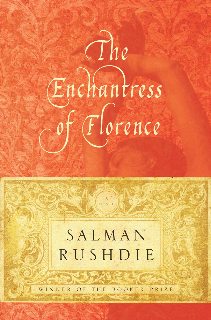
As Iff the Water Genie, who lives in Salman Rushdie’s ‘Haroun and the Sea of Stories’, will tell you, all tales are derived from the wondrous Ocean of the Streams of Stories in Gup City on the moon Kahani.
“Anybody can tell stories. Liars, and cheats and crooks, for example. But for stories with that Extra Ingredient, ah, for those, even the best storytellers need the Story Waters. Storytelling needs fuel, just like a car, and if you don’t have the Water, you just run out of Steam.”
One writer who’s turned the Story Water taps on full blast is Salman Rushdie himself, perhaps the most celebrated writer of our time. With ‘Midnight’s Children’ he gave emerging Indian writers who were writing in English words and a voice all their own. It was almost as if he had sculpted a potent new language, an English hammered and melded in the crowded streets and cinema halls, in the furor of the bazaar and the cacophony of contemporary India.
Ask Professor Homi Bhabha, Director of the Humanities Center at Harvard University, about the importance of Rushdie to the literary world, and he says, “He is a very considerable figure with a great imaginative reach. He liberated the English language from any sense of its purity; he created a tradition of English as a world language.”
He adds, “He made it possible for many, many writers from the subcontinent to give authority to their own experience and more significant than that, he gave authority to the use of the English language in a way that was very much a creation of the post-colonial condition.”
‘Midnight’s Children’ freed other young emerging Indian writers to be bold and unleash the Story Waters and be accepted on their own terms by the west. It went on to win not only the Booker but also the Booker of Bookers for being the best of all the books which have received this prestigious award in 25 years. Recently this epic made news again as it bagged the Booker of Bookers for the best amongst the Booker winners in the past 40 years.

Over the years Rushdie’s oeuvre has included ‘Shame’, which won Frances’ Prix du Meilleur Livre Étranger and was shortlisted for the Booker Prize; ‘The Jaguar Smile’, ‘The Moor’s Last Sigh’, ‘The Ground beneath Her Feet’ and ‘Fury’. ‘Shalimar the Clown’ received the Crossword Fiction Award and was a finalist for the Whitbread Book Awards. His latest is ‘The Enchantress of Florence’ which has all the intricacies and surprises of a Mughal miniature, and is gathering a lot of critical acclaim.
But of course the 800 1b gorilla in the room that you cannot ignore is ‘The Satanic Verses’ – Rushdie’s ill-starred novel, seen by many Muslims as a blasphemy against Islam. The surreal events which followed its publication could have been right out of a Rushdie novel – The Ayatollah Ruhollah Khomeini of Iran places a fatwa on the author, inciting revolts and widespread violence globally, with book bannings and burnings, firebombing of bookstores and death threats, injuries and sometimes even death of the people involved in its publishing or translating.
As practically everyone on the planet knows, Rushdie was forced to go underground for almost a decade and live under police protection. Britain and Iran broke off relations due to the Rushdie fatwa, and it was only in 1998 that there was a thawing, with the fatwa not actively pursued.
Life returned to normal for Rushdie and once again the writer with the hooded eyes and quick smile was seen in readings and salons and partying in New York, even getting married for a fourth time, to the model and food show host Padma Lakshmi. But then again, everybody knows that, right? Recently the marriage ended, but as Rushdie has taken pains to explain, it was not something that he had wanted to end.
Otherwise, life has been good for Rushdie: the honors have been coming thick and fast: the Queen of England knighted him Sir Salman Rushdie. He’s also become a Distinguished Writer in Residence for five years at Emory University faculty and his archives, including private journals documenting the fatwa years, have been placed at Emory. As Emory President James Wagner has observed, “Salman Rushdie is not only one of the foremost writers of our generation, he is also a courageous champion of human rights and freedom.”
Indeed, Rushdie is audacious, unafraid, as outspoken as ever and has continued to challenge human right abuses through his writing and his work as president of PEN. “The defense of free speech begins at the point when people say something you can’t stand,” he said back in 2005. “If you can’t defend their right to say it, then you don’t believe in free speech. You only believe in free speech as long as it doesn’t get up your nose.”
For someone who’s had such an intense – and tense – life, there is a basic kindness about him which is very striking – he’s been supportive of young writers and his respect for knowledge and for people always comes through.
Rushdie knows how to have fun and has a droll sense of humor. What never fails to bring a smile to his eyes is to ask him about his two sons, Zafar, 29 and Milan, 11. He says with sly humor: “There’s a small age gap but this age gap is very useful because it gets rid of all sibling rivalry – at an 18 year age gap, nobody’s quarreling about anything; you have worship going up and affection going down. And it works perfectly. I recommend it – have your children 18 years apart!”
In spite of writing complex books, Rushdie is a diehard party animal and an ardent follower of pop culture. He’s even played cameo roles in movies like ‘Bridget Jones’ Diary’ and ‘Then She Found Me’, has been a guest host on The Charlie Rose Show on television and lyrics from his book, ‘The Ground Beneath Her Feet’ were used by the rock group U2.
Rushdie lived in Bombay till the age of 14, then in Britain and New York. Having lived in many places – even underground – he’s got quite used to the idea of multiple homes. Ask him where home is and he says laconically, “Where I hang my hat.” Yet Bombay, in spite of having changed so much, holds a special place in his heart. He says, “I think that the place where you’ve been a child gives you a feeling of home that nowhere else does. So I do have that feeling about Bombay.”
One of the Booker of Booker judges aptly described ‘Midnight’s Children’ as being ‘unputdownable’ and ‘a bloody great read’. Decades later, his writing still retains these intrinsic qualities which keep readers reading. Yes, Salman Rushdie has the soul of a kathakar, the wandering oral story teller of ancient India. He still has the Story Waters in abundance and all is well in Gup City.
Text© Lavina Melwani
Due to a malfunctioning plugin, all the likes have disappeared. I’ve installed a new one in case you’d like to start again!

1 Comment
Salman Rushdie is one of my favorite authors. Of all his works I like ‘The Ground beneath her Feet’ most. Your profile about him is exhaustive and I like it.